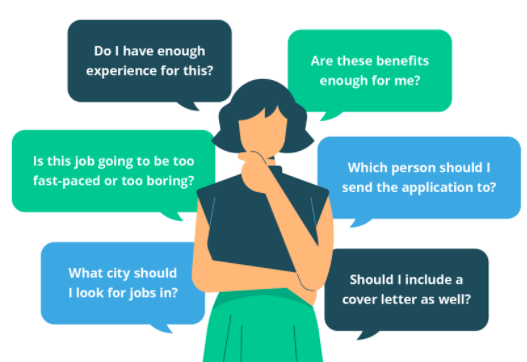Julia is a content creator who resides in New York City. When she’s not writing, you can find her running with her rescue dog in Central Park, eating a vegan burger, or playing tennis.
Life is full of decisions. Each and every day we must make decisions from what we’re going to eat to what tasks we’re going to prioritize at work or home. Having to constantly make choices can lead to a state of mental exhaustion or decision fatigue. This effect can negatively impact both your energy levels and ability to make sound decisions.
During the already stressful process of job searching, there are endless decisions to be made and decision fatigue all too commonly occurs. You have to consider what jobs to apply to, what applications to prioritize, what your salary requirements are, and countless other factors.
This post outlines how to combat decision fatigue in your job search so that you can preserve mental energy and make the best career decisions for you.
6 ways to combat decision fatigue during a job search

Image credit: JobHero

1. Establish hard edges
Creating a job searching schedule can help limit the number of job search related decisions you have to make during the day. Set specific hours during the day or week that you plan to search. For example, you can time block 5-7pm nightly to scroll through job descriptions, fill out applications, respond to requests for interviews, or even prepare for upcoming interviews.
2. Utilize deal breakers
No job is perfect, and there are always going to be pros and cons of accepting a particular offer. Weighing the pros and cons of every relevant job you come across can be both stressful and time-consuming. You can use deal breakers to make faster decisions about whether to skip or apply to a particular position. Consider setting deal breakers that pertain to salary, benefits, commute time, workload, and travel requirements.
3. Limit your search
Don’t waste your time sending applications for positions that you won’t accept or that you aren’t qualified for. Instead, make a list of keywords that will bring up appropriate positions. For example, if you’re looking for a position teaching science, use keywords such as “science teacher”, “biology teacher”, “chemistry instructor” or “natural sciences teacher” to bring up qualified positions.
3. Use if-then rules
It’s also helpful to come up with a few if-then rules to help guide you to apply to positions that are a good fit. For example, if you see “requires 6+ years of experience” and you only have 2, then don’t submit an application. This is a quick way to help you eliminate jobs that aren’t a good fit and preserve mental energy for future applications.
4. Take a break
When you feel like you’re getting burned out, step away from your computer and focus on something else. Feeling stressed out in your job search can be a sign that you are starting to experience decision fatigue. During your break, it’s best to engage in an activity that can help clear your mind, such as going for a walk or listening to music.
4. Use a yes/no list
Finally, consider making a helpful list of statements to consider before submitting your resume for a job or use the one below. If you can answer “yes” to three or more of the statements below, apply!
- You have 80% of the job requirements
- It fits into your long-term career plans
- The commute is acceptable
- The work hours fit your lifestyle
- You have the education requirements
- The pay is sufficient for your lifestyle
- You are excited about the company culture
- The pace will match your working style
- You know people who work there
Finding a new job can be a lengthy and stressful task. It’s important to prioritize your mental health and attack your job search strategically so you can avoid decision fatigue. At the end of the day, doing so will help you find the ideal next job for you.







